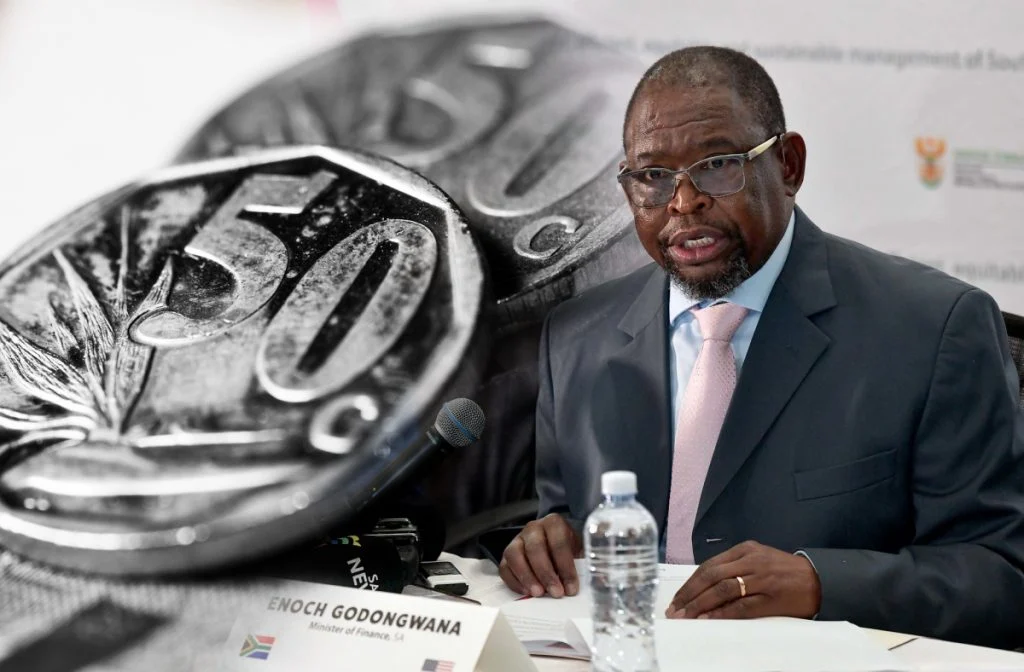
Amidst growing concerns over South Africa’s fiscal trajectory, the rand has weakened, reflecting apprehensions within the market about marked fiscal slippage in the country. The latest figures from the 2023 Medium-Term Budget Policy Statement (MTBPS) have painted a worrisome picture, projecting gross debt to peak at 77.7% of GDP in 2025/26, a significant increase from the previous estimate of 73.6% set in February 2023.
Annabel Bishop, Chief Economist at Investec, underscored the implications of these debt projections, emphasizing that a debt ratio exceeding 70.0% of GDP by 2031/32 compromises the sustainability of government finances. For an emerging market like South Africa, which ideally should maintain a maximum sustainable debt ratio of 60%, such projections raise alarming red flags.
Bishop noted a concerning trend in expenditure, which already accounts for 74.2% of the budget for the first three quarters of 2023/24, while revenue stands at 71.5%. This indicates a notable deviation from the previous year’s figures, further exacerbating the challenges in achieving a favorable debt to GDP ratio.
The fiscal deterioration is evident in the successive budget revisions, with gross debt projections escalating from 72.2% of GDP in the initial 2023 Budget to 74.7% in the November MTBPS. Similarly, the budget deficit has widened from -4.0% to -4.9% of GDP, reflecting a worrying trend of fiscal deterioration.
Market sentiments are particularly apprehensive, anticipating even bleaker outcomes, especially with 2024 being an election year. The ruling party, ANC, has been making ambitious election promises, adding pressure on budgetary expenditures. This heightened expenditure outlook further strains fiscal health and exacerbates concerns among investors.
The rand’s recent performance, hovering just under R19.00/$, underscores the market’s unease and reflects the impact of these fiscal concerns on currency stability. Investec’s GDP forecast for 2024 aligns with the projections in the MTBPS, but there are reservations regarding the sustainability of the projected growth rate, which could further exacerbate the debt-to-GDP ratio.
Financial markets remain wary of increased borrowing, particularly when expenditure consistently outpaces revenue. This unsustainable fiscal trend has led to a surge in bond yields and a decline in credit ratings, signaling a deteriorating economic outlook.
Adding to the apprehensions are fears of increased populism influencing budgetary decisions, as indicated by polls suggesting a potential decline in support for the ANC in the upcoming elections. Market analysts anticipate the ANC may seek a coalition with the more fiscally conservative IFP, though recent polls suggest a steeper decline in ANC’s support, heightening market anxieties.
Moreover, concerns loom over proposed measures to tap into the nation’s Gold and Foreign Exchange Contingency Reserves Account (GFECRA). Questions arise regarding the utilization of these funds, with apprehensions that they might be directed towards short-term objectives like higher public wages instead of addressing the underlying debt issues.
Bishop cautioned against using GFECRA funds for debt reduction, citing the temporary nature of such measures in a weak economy. With South Africa’s staggering debt exceeding R5.2 trillion and the limited capacity to replenish GFECRA swiftly, such strategies offer only temporary relief without addressing the fundamental fiscal challenges.
Additionally, market anxieties are compounded by proposals to expand social welfare programs, such as the transformation of the Social Relief and Distress Grant into a Basic Income Grant, alongside potential bailouts for state-owned enterprises like Transnet and Eskom. Concerns also linger over the efficacy of tax collection efforts amidst economic pressures.
In conclusion, South Africa faces significant fiscal challenges, exacerbated by political uncertainties and economic vulnerabilities. Addressing these concerns requires a concerted effort towards fiscal discipline, prudent economic policies, and effective governance to restore market confidence and secure long-term economic stability.
This website uses cookies.